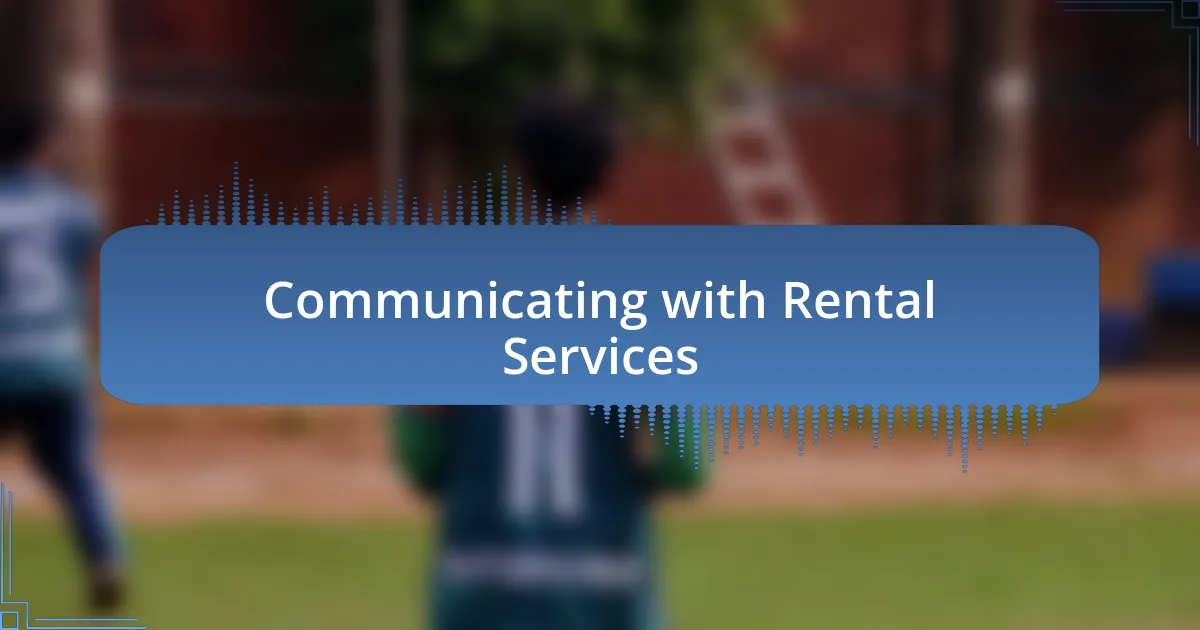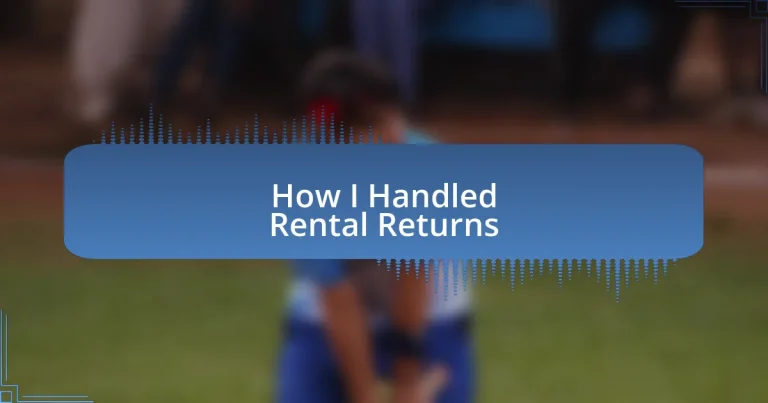Key takeaways:
- Understanding rental return policies is crucial to avoid unexpected fees; reading the fine print and confirming details is essential.
- Documenting the condition of rental items through photos and notes safeguards against disputes over damages.
- Effective communication with rental services, including asking questions and following up, helps resolve misunderstandings and establishes clarity.
- Managing late returns involves being honest with rental agencies and knowing your rights concerning late fees to advocate for yourself.

Understanding Rental Return Policies
When I first encountered rental return policies, I was surprised by how often they vary across different rental places. One time, I returned a rental car just a few minutes late and was shocked to find out about a hefty fee. It made me realize how crucial it is to read the fine print and understand the specific terms before signing any agreement.
Navigating these policies can sometimes feel overwhelming, but taking that time to decipher them can save you both money and stress. I remember feeling anxious about returning a rental item, worried that I might miss something. So, I made it a habit to double-check the checklist provided by the rental company, ensuring that every detail was accounted for.
Isn’t it funny how we often overlook the simplest guidelines? I found that clear communication with rental providers significantly alleviated my concerns. Asking questions directly and clarifying any doubts before the return helped me feel more confident, ultimately leading to a smoother experience.

Preparing for the Return Process
Preparing for the return process can sometimes feel like a juggling act. I remember one time, I prepared for a rental equipment return by meticulously checking off the items on their list. This allowed me to feel more in control, and when I arrived at the drop-off location, the representative was impressed by how organized I was. It’s those little details that can make a big difference in the overall experience.
I also learned the importance of timing during the return process. My first experience was a bit rushed, and I ended up returning my car during peak hours, which led to long lines and added anxiety. Now, I always plan to return items during less busy times to create a smooth and stress-free experience. It really helps to keep my nerves in check, knowing I have extra time just in case.
Finally, gathering all necessary documents and receipts beforehand is key. One time, I found myself scrambling for a rental agreement at the return point, feeling the anxiety rising in my chest. Since then, I’ve created a designated folder on my phone where I store all rental-related documentation. This simple step has saved me countless moments of panic and ensures that I can address any issues that might arise during returns efficiently.
| Preparation Step | Personal Experience |
|---|---|
| Checklists | Using checklists helped me avoid missing items on a rental equipment return. |
| Timing | Returning during off-peak hours eased my anxiety compared to my first rushed experience. |
| Document Organization | Creating a digital folder for rental agreements saved me during a stressful return moment. |

Documenting the Condition of Items
Documenting the condition of rental items before returning them is crucial. One time, I learned this lesson the hard way when a rental company charged me for damages that I knew weren’t my fault. To protect myself, I started taking time-stamped photos of every item I returned, capturing any wear and tear. This habit not only gave me peace of mind but also served as a solid defense if any disputes arose later.
Here are some practical steps I follow when documenting the condition of rental items:
- Photographic Evidence: Take clear pictures from multiple angles. This visual record is invaluable should there be any discrepancies later.
- Written Notes: Jot down any existing scratches or dents in the rental agreement or a separate document. Being specific helps with clarity.
- Time Stamps: Ensure your photos are time-stamped, indicating when they were taken. This adds an extra layer of credibility.
- Contact Info: Keep a note of the representative you dealt with, in case you need to refer back to them.
- Video Documentation: For larger items, a quick video walkthrough can showcase the overall condition, providing more context than photos alone.
By incorporating these steps, I find that I can approach returns with more confidence, reducing stress and any potential financial disputes.

Communicating with Rental Services
When it comes to communicating with rental services, clarity is key. I remember a scenario where I called a rental agency to discuss a minor issue with a returned item. I made sure to explain my concerns in detail, which not only helped the customer service representative understand my situation better but also set the stage for a more productive conversation. It’s amazing how a little transparency can go a long way in resolving misunderstandings.
I always find it valuable to ask questions while communicating with rental services. For instance, during one return, I asked about their policies on wear and tear. This helped me understand their perspective and manage my expectations for future rentals. It’s surprising how much you can learn by simply being curious and proactive in your discussions.
Following up with an email after our conversation is something I consider essential. Not long ago, after returning a high-value item, I sent a brief email summarizing our discussion. This not only reinforced my understanding of what we had talked about but also created a written record of our agreement. I’ve discovered that this practice helps build trust and ensures that everyone is on the same page, reducing the chances of any future disputes.

Managing Late Returns and Fees
Late returns can be a headache, but they don’t have to ruin your experience. I once found myself returning a rental car well past the due time due to unexpected traffic. As I approached the agency, anxiety washed over me, worried about the accumulating fees. This taught me that staying aware of how companies calculate late fees can significantly ease that stress.
When faced with a late return, I’ve learned that honesty works wonders. By proactively explaining my situation to the rental agency, I was relieved to find they waived a portion of the late fee simply because I communicated openly. Isn’t it reassuring to know that people are generally understanding when you’re truthful? This experience reinforced in me the importance of addressing the issue head-on rather than avoiding it.
I also advocate for knowing your rights regarding late fees. I recall a situation where I disputed an unfair fee on a rental item I returned, thinking it was unnecessarily high. After researching the company’s policy, I composed a well-reasoned email that led to a refund. It made me realize how empowered I felt when I stood up for myself, turning a frustrating situation into a positive outcome. Have you ever found information that changed the way you handled a similar instance?

Tips for a Smooth Return
When preparing for a smooth return, I suggest you always conduct a thorough check of the rental item before heading back. I once overlooked a small scratch on a rental bicycle, only to face questions during the return process that left me flustered. Taking a few moments to inspect the item can help you avoid unpleasant surprises and foster a smoother conversation with the return staff.
Another critical tip is to arrive at the rental location a bit earlier than necessary. During one of my returns, I encountered a long line that made me anxious about missing my deadline. By allowing for some extra time, I felt more at ease and could focus on ensuring everything was in order, rather than rushing through the process. Have you ever felt the weight of time pressing down on you during a return?
Lastly, keeping all the rental documentation handy is invaluable. On one occasion, I misplaced a receipt, which led to confusion about my rental duration. Being organized and having everything in one place can save time and energy, allowing you to address any issues confidently. Why take a chance on miscommunication when a little preparation can go such a long way?


